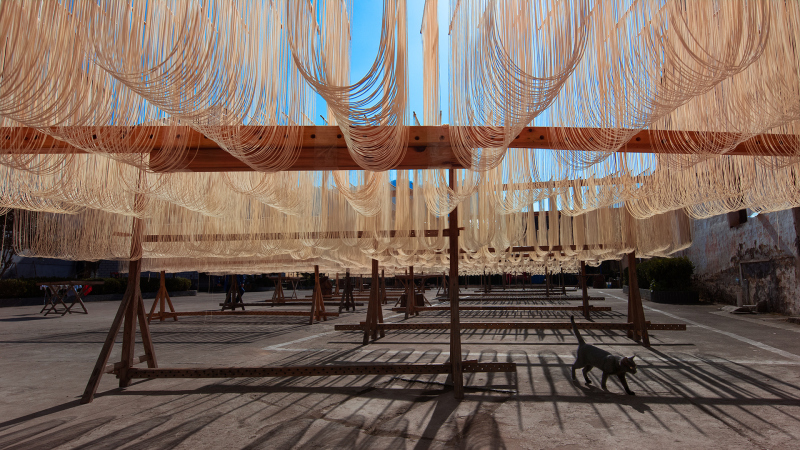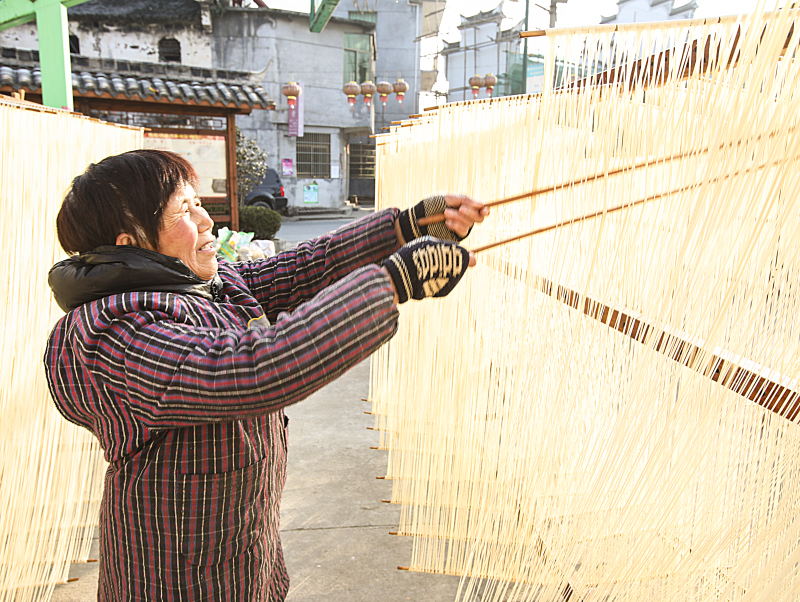Almost every house in Panzhoujia Village in Pujiang County in central Zhejiang makes noodle, but it was not until recently that the fact was made known. Granny Knows Best, an eight-episode food documentary jointly produced by Tencent Media and Ryan Pyle Production which stars Jamie Billow, a British chef based in Beijing, has made the longevity noodle made in the mountain village in Pujiang well known in China.
Panzhoujia consists of two villages respectively called Panjia and Zhoujia (the two names literally refer to the Pan clan and the Zhou clan). The two separate villages have long since merged into one. Granny Chen of Panzhoujia appears in the first episode of the food documentary released in October 2019.

The village nestles in the mountains about ten kilometers north of the county capital. In the past, the land-locked village was remote from anywhere and residents led a life that was far from being materially good. Noodle making in the village goes back to about 600 years ago. It was Zhou Fan, a native of Zhoujia Village and scholar of the Qing Dynasty (1644-1911), who put the noodle-making village on the map of the country. Dai Diansi, a student of Zhou Fan, became a tutor to the prince who later became Emperor Daoguang ruling from 1820 to 1850. Zhou often treated his students and colleagues with the noodle made in his home village. Then one day Dai Diansi brought the noodle into the palace kitchen and made the noodle well known.
With a population of 1,600 in more than 500 families, the village is now known for noodle making.

But in the past, noodle didn’t lift villagers out of poverty largely because of poor transportation. It took about 2 hours for an adult male to travel from the village to the county capital, the nearest big market. Zhou Xuelei, 35, remembers how his father set out on a noodle peddling journey long before dawn and came back home after dusk settled in. He carried a load of noodle with a shoulder pole. Noodle enjoyed a fine reputation, but the transportation was a huge barrier. Supply could not meet demand. It was not until 2004 that Panzhoujia decided to make noodle business big. That year, the village registered a trademark for the village noodle. In 2006, a noodle co-op was organized. Later, the co-op set up a wholesale outlet in the capital city. Business boomed. In 2009, the trademark was recognized as a famous brand in Jinhua. In 2015, it became a provincial trademark. Also in 2015, the Panzhoujia noodle co-op became a national model, the only one of its kind in Pujiang.
Nowadays, villagers still make the noodle manually. A standard recipe formulated to assure quality is faithfully followed by all noodle makers in the village. The time-consuming procedure needs a lot of attention. In some steps of the noodle-making process, one gets up one or two times a night to check whether unfinished product needs adjusting.

As the village sits in the mountains, noodle can be produced almost all year round except the hottest summer months. The best and busiest season starts in November. Panzhoujia has a record for noodle business: the co-op sells two tons of noodle a day. Production for all the orders in the winter season lasts till the Spring Festival. Most houses in the village have a drying ground. Noodle drying in the village is a scene in winter that attracts photographers and tourists. As tourists visit the village frequently, tourism has long since become a pillar of the village economy. After all, few young villagers are willing to be noodle makers. Most noodle makers in the village are in their 50s and 60s. However, as young villagers stay to serve tourists, they learn how to make noodle in their spare time and help their parents out when noodle-making gets busy.
The longevity noodle is interesting. As most Chinese people eat noodle on their birthday, such a birthday treat is usually called longevity noodle. The longevity noodle made in Panzhoujia is indeed long. In 2014, a noodle maker from the village demonstrated the noodle-making wonder in a national reality show. Using one kilogram flour, he made a single narrow ribbon-like noodle which was 200 meters long. His demonstration brought down the house.
约600年前,潘周家的祖先们为了丰富饮食文化,用自家的小麦粉,在加工刀切面、包子和馒头的基础上研制出“潘周家手工面”。手艺代代相传,村里500余户几乎家家都会做这手工面。
一档名为《奶奶最懂得》的美食类节目在各大视频平台上线。一个中文说得很溜的英国人,名叫大米,既是旅行者,也是美食大厨。他不仅深谙美食之道,还踏遍中国,寻找隐藏的美食。
节目中,他一路在中国旅行,寻找失传的菜谱,寻找最朴实的情感,一共走了8个地方,找到了16位奶奶,探索隐藏到中华大地的家乡味道。
节目第一期,大米来到了浙江金华,看上了金华浦江潘周家村的长寿面。这款长寿面,究竟有多神奇?
制面手艺代代相传600年
浦江县城北20余里,一岭横亘。以岭为界,当地百姓称岭北为“山里”。“山里”平均气温比山外低3℃左右,过去交通不便,经济也差一筹。潘周家村即在“山里”深处,群山环绕。
如今,山村还留存有不少徽派建筑,木结构的房子,让村子愈显宁静。
不过每年11月之后,这种宁静会被打破,家家户户都要着手做一件很有仪式感的事——晒长寿面。长寿长寿,一根到底最吉利,挂在面架上,线条感十足。古村落更是凭着这根手工长寿面焕发出新的生机。
为什么一个小小山村,几乎家家户户都会做面条?这要从潘周家的历史说起。
村里的老人介绍,潘周家村其实是两个村,一个叫潘家,一个叫周家。由于两个村庄已经连在一起,所以有了潘周家村的合称。
约600年前,潘周家的祖先们为了丰富饮食文化,用自家的小麦粉,在加工刀切面、包子和馒头的基础上研制出“潘周家手工面”。
手工面的第一次扬名,不得不提潘周家出的一个名人——周璠。
如今潘周家还流传一句谚语:“只有状元的学生,没有状元的先生。”而周璠就是状元的先生,而状元说的就是他的学生戴殿泗。
周璠常以潘周家手工面招待文人诗友。一次,他的学生戴殿泗将此面带入宫中,受到宫内嘉誉,因而享誉江南。
就这样,做手工面的手艺代代相传,村里1600余人口、500余户,几乎家家都会做这手工面。
两斤面粉拉出200米的面条
做面听起来没什么稀奇的,但潘周家村的面,跟别处的不太一样。
浦江当地人做寿,有吃长寿面的习俗。面条讲求一根到底,寓意长长久久。潘周家的面,一斤面粉可以拉一百多米长,而且中间不断,能讨个好彩头。
然而,周璠带动面条,已经过去了两百多年,但由于地处偏僻,让潘周家面条走出山村却变得困难。
35岁的周旭磊,从父辈开始就是做面条的,手艺在村里首屈一指。他总是能记起当年父亲挑着担子,翻山越岭把面条卖到县城的艰辛。
那时候,从潘周家到县城,需要步行、转车……单程就要两个多小时。父亲会挑着几箱面条拿到县城叫卖,天没亮就出发,天黑了才到家。
虽然辛苦,但也看到了商机:山外的人,都认潘周家的面,每次几十斤面条总是不够卖。
年轻人,为面条想到了出路,也为山村带来了活力。
2004年,潘周家注册商标,2006年成立合作社,吸收农户加入。潘周家的“一根面”,慢慢在县城有了批发部。
如今,面条虽然仍旧需要手工生产,但配比有了标准,口感也有了保障。
2014年,周旭磊还带着潘周家“一根面”参加了第八季《中国梦想秀》第四期节目。当场用2斤面粉,拉出长达200多米可绕演播厅一周的一根面,震惊全场的同时也获得了满堂喝彩。
潘周家的面条畅销到什么地步?生意好的时候,一天能卖出一两吨,订单一排就是几个月。
冬日面条晒场成独特风景
有了合作社,潘周家的面,除了暑热天气,几乎全年都在生产。但对于农户自家来说,每年11月之后,天气凉爽干燥,正是做“一根面”的好时候。
“一根面”要怎么做?村里随便找个奶奶,都能给你演示一遍。
陈奶奶,70多岁了,从外村嫁过来,做“一根面”的手艺是婆婆教的。
“首先要把盐放到麦粉里,搅拌起来。”盐放多少?村里有个口诀:一斤麦粉半两咸。不过现在口味清淡,许多人家里做面盐放得少了。
待盐融化后加入麦粉,揉成面团用力捶打,表面都光滑了,盘成圆圆的薄薄的一块,绕圈把它切成一条线,然后拉长、揉搓。
面条要盘在架子上,每一根分散,断了还要接起来。
和面、发酵、割面、盘面、脱条、晾晒……每一道工序,都很耗费时间。就拿拆分面条来说,分一次还不够,稍微动一下,面条又黏了起来,起码要分两三次。经常要过来检查,白天晚上都没得休息。
“一根面”做工精细、制作工序复杂,具有久煮不糊、柔软滑润、嚼不粘齿的特点,面条筋道到筷子都夹不断。在浦江当地吃“一根面”,服务员可能还会给你递上一把剪刀,体验也是蛮别致的。
对于很多在外的年轻人来说,这碗面,清清淡淡,能勾起家乡的记忆简简单单却足以暖心。
冬日暖阳,每家每户都在晒场上支起面架,千万条白色面线飞泻而下,是一道独特的风景,更吸引了不少摄影爱好者前来采风。
但因为工序复杂,为了一根面条,常常要没日没夜地守着。村里愿意做这行的年轻人越来越少。如今做面条的主力,都已经五六十岁。村里发展起了乡村旅游,让年轻人体验制作“一根面”,用另一种方式将这种文化遗产传承下去。
